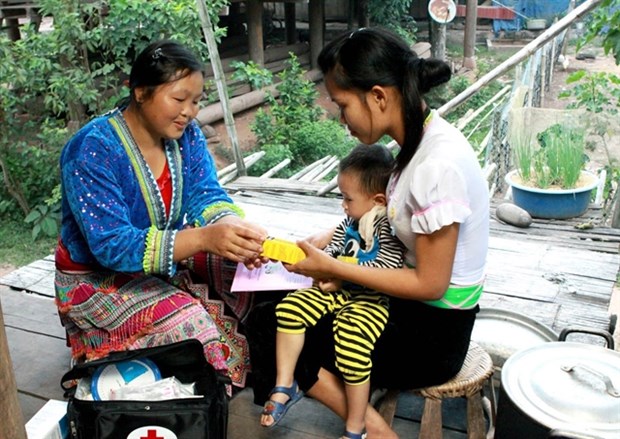About 40,800 female births estimated to be missing every year
Vietnam is facing the unbalanced sex ratio at birth (SRB), with about 40,800 female births estimated to be missing every year, according to the State of the World Population Report 2020.
 A village-based midwife gives health care guidance to a mother in Muong Nhe district, the northern mountainous province of Dien Bien. (Photo: VNA)
A village-based midwife gives health care guidance to a mother in Muong Nhe district, the northern mountainous province of Dien Bien. (Photo: VNA)Hanoi (VNA) – Vietnam is facing the unbalanced sex ratio at birth (SRB), with about 40,800 female births estimated to be missing every year, according to the State of the World Population Report 2020.
The report was launched on July 17 in Hanoi by the United Nations Population Fund (UNFPA).
Gender equality has improved in Vietnam over the years, but gender-biased sex selection remains persistent and has been identified as the major cause of an imbalance in the SRB in the country, it found.
The skewed SRB in Vietnam was first identified in 2004, and since 2005, the imbalance towards more boys has rapidly increased and reached 111.5 boys per 100 girls in 2019 as indicated in the 2019 Census, against the biologically normal SRB of 105.
Speaking at the launching ceremony, Pham Ngoc Tien, director of the Gender Equality Department under the Ministry of Labour, Invalids and Social Affairs said: “Vietnam has always considered gender equality as both a goal and a driving force for sustainable development. We have built and continued to improve the legal framework to better work in this important and relatively unfamiliar area.”
Bringing SRB to the natural balance is one of the goals of the National Strategy on Gender Equality for the 2021 - 2030 period which is being developed to submit to Prime Minister Nguyen Xuan Phuc for approval this year, he said.
Naomi Kitahara, UNFPA Representative in Vietnam, said: “We must put an end to son preference and the undervaluing of girls in our efforts to promote gender equality in the country. Vietnam is making progress, but the progress must be accelerated within the context of the Decade of Action for Sustainable Development Goals.”
“In this regard, men have a special role to play. I call on Vietnamese men to raise the value of girls and demand equal treatment and equal rights. In particular, we need men and boys to support this effort,” she added.
At the launch, the Government and UNFPA affirmed their commitment and called for urgent action to end this harmful practice.
In the world, an estimated 4.1 million girls will be subjected to female genital mutilation this year. As many as 33,000 girls under age 18 will be forced into marriages, usually to much older men. Also, an extreme preference for sons over daughters in some countries has fueled gender-biased sex selection or extreme neglect that leads to their death as children, resulting in 140 million missing females.
UNFPA Executive Director Natalia Kanem said: “We must tackle the problem by tackling the root causes, especially gender-biased norms. We must do a better job of supporting communities’ own efforts to understand the toll these practices are taking on girls and the benefits that accrue to the whole of society by stopping them.”/.













